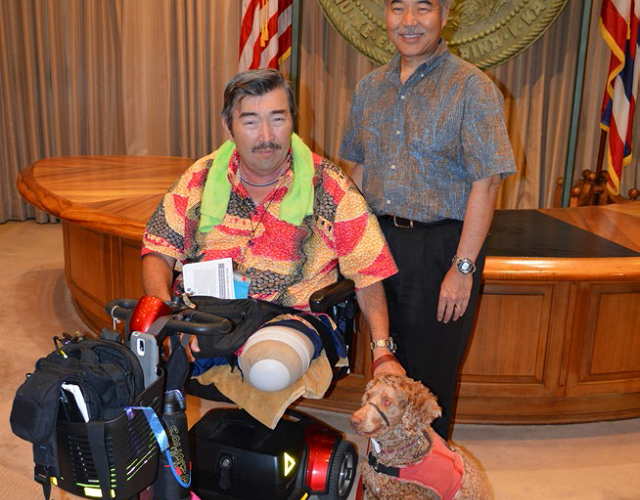When you enter a business nowadays, you may see someone with a dog on a leash or in a cart boldly going
where previously no dog has gone before. Generally, businesses that have a “no pets” policy must still allow service animals. However, determining if a store patron really has a service animal when they come in
the door is a challenge.
The legal regulations are confusing at best and often lead to more questions than answers. Some store owners are able to solve the dilemma by making their establishments “dog friendly;” but that seemingly simple solution is not always practical or possible for many businesses.
According to Jim Kennedy, Executive Director of Hawaii Fi-Do Service Dogs, the “gold standard” detailing service animal access is a document posted on the U.S. Department of Justice (DOJ) Civil Rights Division website. The link is https://www.ada.gov/regs2010/service_animal_qa.pdf.
Under the Americans With Disability Act (ADA), a service dog is trained to work or perform tasks for someone with a disability. Those tasks must be directly related to the person’s disability. However, the dog is not required to be professionally trained or have a special certificate or identification. Also, it doesn’t have to wear a vest, patch or special harness to identify it as a service animal.
Although it is not always obvious what service the animal provides, you can’t ask too many questions, either. According to the DOJ article, only these two questions are allowed:
• Is the dog a service animal required because of a disability?
• What work or task has the dog been trained to perform?
You can’t ask for documentation for the dog, require the dog demonstrate the task, or ask about the person’s disability.
From the perspective of the service dog owner/handler, the situation is even more frustrating. “The service dog handler is really worried about ill-behaved dogs,” says Kennedy.
It’s not unusual for a service dog to be growled at or even attacked by an unruly pet which can seriously impact the service dog’s ability to continue to perform its duties. A service dog is an integral part of its owner’s life, as it provides physical assistance, companionship, and psychological and social benefits. This enables the owner to achieve a more fulfilling and independent lifestyle.
There are other terms used to describe animals that help their owners in some way, such as emotional support, therapy, or comfort animals. However, these animals have not been trained to perform specific tasks or jobs to meet the needs of owners (who have disabilities). Therefore, they are not considered service dogs, just pets.
Says Executive Director Kennedy, “What we are against are people saying their dogs are service dogs
when they’re not. It’s a safety and ethical issue.”
Furthermore, the DOJ document clearly states that if any dog inside a business is out of control- whether
it is a service dog or not – and the handler does not take effective action, staff may ask that the animal be removed from the premises. (Read the DOJ document carefully.)
Hawaii Fi-Do Service Dogs, founded by Program Director Susan Luehrs, has been training service dogs for people with disabilities other than blindness in Hawaii since 2000. The small organization run by Luehrs (full-time) and Kennedy (half-time) relies on a host of volunteer puppy trainers who, with Luehrs guidance, train in the community to learn how to deal with a variety of situations and distractions.
Over a two-year period, dogs learn more than 90 commands, basic obedience, social skills, and tasks at a
cost of $16,000 to $20,000 per animal. Hawaii Fi-Do is the only Assistance Dog International certified training program on the island and is required to keep ongoing data and testing on file for each dog. The organization has five to six dogs graduate annually and currently has 12 dogs in training. Many of their graduates find homes with disabled veterans.
More information is available by going on the Hawaii Fi-Do website, https://www.hawaiifido.org, or by
contacting the agency at (808)638-0200.



